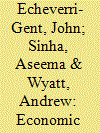| Srl | Item |
| 1 |
ID:
180898


|
|
|
|
|
| Summary/Abstract |
Narendra Modi came to power in 2014 promising robust economic management and more employment. The campaign promise of “maximum governance, minimum government,” created hope that Modi would transform India’s economy by removing obstacles to growth and job creation. We assess the Modi government’s economic policies from 2014–2019 focusing on salient initiatives like demonetization, bankruptcy law, GST reforms, and “Make in India.” We argue that Modi’s economic policies must be understood, first and foremost, as a political strategy to build political support and ensure the BJP’s hegemony through the next decade. In addition, we show that Modi’s success in building his personal image as a decisive leader perversely triggered institutional changes such as centralization of decision-making and political management of information that diminished India’s state capacity and led to policies that failed to address, and in many cases exacerbated, India’s economic problems.
|
|
|
|
|
|
|
|
|
|
|
|
|
|
|
|
| 2 |
ID:
116403


|
|
|
|
|
| Publication |
2012.
|
| Summary/Abstract |
This article provides an analytical discussion on the rise of political Islam in Turkey by examining the rise of the Islamic Welfare Party in the 1990s. The study, utilizing a historic analysis, reveals that the Islamic opposition in Turkey is both a reaction to Kemalist reforms and to undesirable local conditions, especially, economic distress, unjust distribution of national wealth, corruption, and perceived lack of freedom. Certain structural conditions aiding the Welfare Party to increase its power are also discussed. Many lessons learned in terms of managing the Islamic challenge and implications with respect to the prospect are addressed at the end.
|
|
|
|
|
|
|
|
|
|
|
|
|
|
|
|